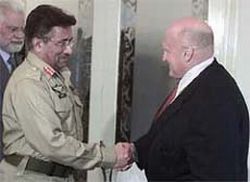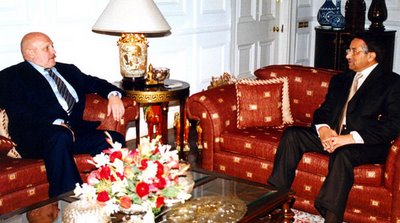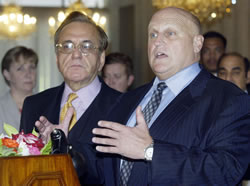Saturday, September 16, 2006
Armitage Hearts Musharraf
A few weeks ago, in an Op-Ed published by the LA Times, Selig S. Harrison, director of the Asia program at the Center for International Policy, wrote that Pakistan President "Musharraf's most vocal defender is former Deputy Secretary of State Richard Armitage."

More excerpts from Harrison's Pakistan: Friend or Foe? column:
Musharraf's most vocal defender is former Deputy Secretary of State Richard Armitage, who has urged continued support for him "no matter how frustrated we become at the pace of political change and the failure to eliminate Taliban fighters from the Afghan border." Musharraf is better than what might come after him, Armitage argues, and is a moderate who has done his best to fend off the entrenched forces of Islamic extremism in Pakistan.
But this argument does not hold up against mounting evidence that, as an ally, Musharraf has been an opportunist from the start who has continued to help the Taliban (just as he had done before 9/11 ) and who has gone after Al Qaeda cells in Pakistan only to the extent necessary to fend off U.S. and British pressure.
"You've got Pervez Musharraf, who is a great leader in my view in Pakistan, trying to bring a nation of 160 million into enlightened moderation," Armitage told Charlie Rose in June.
Armitage in August of 2002 on Musharraf:
"Well, we do believe that President Musharraf is a man of his word and we’re going to treat him as such and treat his word with all the care which it deserves," said US Deputy Secretary of State Richard Armitage, appearing late Friday on PBS’s NewsHour with Jim Lehrer programme.

In August, Armitage co-wrote an Op-Ed with former deputy assistant secretary of state Kara L. Bue entitled "Keep Pakistan on Our Side."
On Sept. 12, 2001, the United States gave Pakistan a stark choice — be with us or against us. Understanding the dangers and opportunities of this choice, President Pervez Musharraf chose to stand with America, and since then he has taken tremendous steps to fight Islamic extremists and move Pakistan toward enlightened moderation.
....It is critical that Pakistan not be shortchanged in our engagement in the region. While India is clearly important to us for its strategic and economic promise, the success of Pakistan holds the key to stability in the region and perhaps throughout the Muslim world. Were Pakistan to fail, there would be no hope for Afghanistan, a dimmed future for India and an increased threat of Islamist terrorism globally.
....As the Sept. 11 Commission correctly pointed out: "If Musharraf stands for enlightened moderation in a fight for his life and for the life of his country, the United States should be willing to make hard choices too, and make the difficult long-term commitment to the future of Pakistan."
As Armitage and Bue neglect to point out, in December of 2005 the 9/11 Commission followed up on the Pakistan recommendation in their 9/11 Public Discourse Project, and gave the U.S. government a C+ in their graded report for failing to "support Pakistan against extremists."
From the Final Report on 9/11 Commission Recommendations:
U.S. assistance to Pakistan has not moved sufficiently beyond security assistance to include significant funding for education efforts. Musharraf has made efforts to take on the threat from extremism, but has not shut down extremist-linked madrassas or terrorist camps. Taliban forces still pass freely across the Pakistan-Afghanistan border and operate in Pakistani tribal areas.
In a November of 2005, Vice Chair Lee H. Hamilton talked about how "disappointed" the commissioners were that Pakistan remained a "sanctuary for terrorists":
Taliban still pass freely across the Pakistan-Afghanistan border and operate in Pakistani tribal areas.
Terrorists from Pakistan carry out operations in Kashmir.
Full cooperation with the United States in hunting down Usama Bin Ladin and his supporters has not been forthcoming.
Madrassas with known links to terrorist groups have not been closed down.
Finally, promised democratic reforms are not in evidence.
Perhaps, I should also "point out" to Armitage and Bue that the Sept. 11 Commission correctly used the conditional "if" when they wrote about Musharraf's alleged belief in "enlightened moderation."
More from Armitage's August Op-Ed in the Times:
We believe General Musharraf continues to stand for these principles and deserves our attention and support, no matter how frustrated we become at the pace of political change and the failure to eliminate Taliban fighters on the Afghan border. It was such short-term thinking that almost led to the derailment of the F-16 deal in Congress.
Instead of threats, we should increase our senior-level interaction with Pakistan across the board, involving cabinet secretaries beyond those representing the State and Defense Departments and placing a new emphasis on trade issues.
Perhaps, "a new emphasis on trade issues" could benefit a petroleum company such as Conoco-Phillips, to which Armitage was recently elected to the board of directors.
Or maybe ManTech International Corporation, "a leading provider of innovative technologies and solutions focused on mission-critical national security programs for the Intelligence Community and the Departments of Defense, State, Homeland Security, Justice and other U.S. federal government customers," where Armitage also sits on the board of directors.
Or maybe Japanese bioscience firm Transcutaneous Technologies where Armitage also sits on the board of directors.
Or maybe himself.
His co-writer for the Times Op-Ed, Kara Bue is also a founding member of Armitage International, which provides "multinational clients with critical support in the areas of international business development, strategic planning, and problem-solving."
Sensitivity
In October of 2003, Armitage held a joint press conference in Pakistan with Foreign Minister Khurshid Mahmood Kasuri.

"I assured our friends here in Pakistan and last week in New York that anything we do that affects Pakistan, we are extraordinarily sensitive about," said Armitage in 2003. "We understand in full the concerns, the sensitivities of Pakistan."
"We do not feel that anything we are engaging in will disrupt the status quo where it is detrimental to Pakistan," Armitage assured America's "ally" against terrorism.
Status quo.
From President Bush's press conference on Friday:
Q Thank you, Mr. President. Earlier this week, you told a group of journalists that you thought the idea of sending special forces to Pakistan to hunt down bin Laden was a strategy that would not work.
THE PRESIDENT: Yes.
Q Now, recently you've also --
THE PRESIDENT: Because, first of all, Pakistan is a sovereign nation.
Q Well, recently you've also described bin Laden as a sort of modern day Hitler or Mussolini. And I'm wondering why, if you can explain why you think it's a bad idea to send more resources to hunt down bin Laden, wherever he is?
THE PRESIDENT: We are, Richard. Thank you. Thanks for asking the question. They were asking me about somebody's report, well, special forces here -- Pakistan -- if he is in Pakistan, as this person thought he might be, who is asking the question -- Pakistan is a sovereign nation. In order for us to send thousands of troops into a sovereign nation, we've got to be invited by the government of Pakistan.
Secondly, the best way to find somebody who is hiding is to enhance your intelligence and to spend the resources necessary to do that; then when you find him, you bring him to justice. And there is a kind of an urban myth here in Washington about how this administration hasn't stayed focused on Osama bin Laden. Forget it. It's convenient throw-away lines when people say that. We have been on the hunt, and we'll stay on the hunt until we bring him to justice, and we're doing it in a smart fashion, Richard. We are. And I look forward to talking to President Musharraf.
Look, he doesn't like al Qaeda. They tried to kill him. And we've had a good record of bringing people to justice inside of Pakistan, because the Paks are in the lead. They know the stakes about dealing with a violent form of ideological extremists. And so we will continue on the hunt. And we've been effective about bringing to justice most of those who planned and plotted the 9/11 attacks, and we've still got a lot of pressure on them. The best way to protect the homeland is to stay on the offense and keep pressure on them.
Thus continues the sensitivity status quo.
|
